
Journal of Futures Studies
Scope & Guideline
Transforming Challenges into Opportunities
Introduction
Aims and Scopes
- Interdisciplinary Futures Research:
The journal emphasizes the integration of various disciplines including design, education, sociology, and technology to explore complex future scenarios and solutions. - Creative and Speculative Methodologies:
Utilizing creative methodologies such as speculative design and scenario planning, the journal encourages innovative approaches to envisioning and constructing futures. - Transformation and Sustainability:
A core focus is on transformative practices that promote sustainability and social justice, addressing pressing global challenges through futures literacy and participatory research. - Futures Literacy and Education:
The journal seeks to enhance futures literacy among practitioners and educators, providing insights into effective pedagogical frameworks that prepare individuals for future challenges. - Ethics and Responsible Futures:
A strong emphasis is placed on ethical considerations in futures studies, examining the implications of technology and policy decisions on future generations.
Trending and Emerging
- Futures in Education and Pedagogy:
A growing emphasis on integrating futures thinking into educational frameworks, equipping students with skills to navigate and shape their futures effectively. - Sustainability and Environmental Futures:
There is an increasing focus on sustainable futures, particularly in relation to climate change and ecological issues, highlighting the urgent need for responsible practices. - Social Justice and Equity in Futures Studies:
Emerging themes around racial justice and equity are becoming more prominent, with research exploring how futures studies can address systemic inequalities. - Technological Implications and Ethics:
Growing interest in the ethical implications of emerging technologies, including AI and neurotechnology, reflecting concerns about their impact on society. - Participatory and Community-Based Futures Research:
There is a rising trend in participatory methodologies that engage communities in foresight processes, ensuring diverse voices are heard in shaping futures.
Declining or Waning
- Traditional Economic Models:
Papers focusing on conventional economic forecasts and models have seen a decrease, with a shift towards more innovative and holistic approaches to economic futures. - Linear Forecasting Techniques:
The reliance on linear and deterministic forecasting methods is waning, as the journal increasingly favors complex systems thinking and non-linear approaches. - Narrow Technological Focus:
There has been a reduction in papers solely centered on specific technologies without broader societal implications, reflecting a move towards examining technology within larger socio-economic contexts. - Historical Analysis without Futures Context:
Studies that primarily focus on historical events without connecting them to future implications are becoming less common, as the journal prioritizes future-oriented analysis. - General Futurism without Specific Applications:
There is a decline in general discussions of futurism that lack practical applications or real-world implications, moving towards more actionable and relevant futures research.
Similar Journals

Philosophies
Fostering dialogue across philosophical landscapes.Philosophies is a leading open-access journal published by MDPI, dedicated to advancing research in the fields of Philosophy and the History and Philosophy of Science. Established in 2016 and located in Switzerland, this journal aims to stimulate scholarly dialogue and innovation by providing a platform for diverse philosophical perspectives and interdisciplinary approaches. With a commendable impact factor and ranking—Q2 in both Philosophy and History and Philosophy of Science in 2023—Philosophies stands out in the academic community with Scopus rankings placing it in the top tiers of its categories (Rank #176/806 in Philosophy and Rank #65/223 in History and Philosophy of Science). Authors and researchers are encouraged to submit their works as this journal continues to foster open access to knowledge, enabling global dissemination and collaboration among experts and enthusiasts alike. Join us in exploring the profound questions that shape our understanding of the world and human experience.

Politics Philosophy & Economics
Innovating Understanding in the Social SciencesPolitics, Philosophy & Economics, published by SAGE Publications Inc, is a leading interdisciplinary journal that spans the critical domains of politics, philosophy, and economics. With a strong commitment to fostering scholarly dialogue, this journal caters to researchers and practitioners by addressing both theoretical queries and practical implications within the social sciences. Established in 2002, it has garnered a notable reputation, currently holding a Q2 quartile ranking in Economics and Econometrics, and Q1 rankings in both Philosophy and Sociology and Political Science. With impactful publications, this journal continues to play a pivotal role in shaping contemporary debates and fostering empirical inquiry, making it an essential resource for academics and students alike. Notably, it has received significant acclaim in Scopus rankings, offering a robust platform for scholarly exchange.
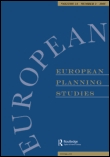
EUROPEAN PLANNING STUDIES
Unraveling Complexities in Urban Studies and DevelopmentEUROPEAN PLANNING STUDIES is a leading journal in the field of urban studies, published by Routledge Journals, Taylor & Francis Ltd. Since its inception in 1993, this esteemed publication has been pivotal in advancing the discourse on geographical, planning, and developmental issues across the European landscape. With a commendable 2023 Q1 rating in the Geography, Planning, and Development category and a remarkable rank of #88 out of 821 in Scopus, the journal is recognized for its rigorous peer-reviewed articles that provide innovative insights and critical analyses. Although the journal does not offer open access, it caters to a diverse readership, including researchers, professionals, and students, ensuring a comprehensive understanding of contemporary planning challenges and strategies. The journal's objectives include fostering interdisciplinary dialogue among planners, policymakers, and academics, making it an essential resource for those engaged in shaping sustainable urban environments and informed spatial governance in Europe and beyond.
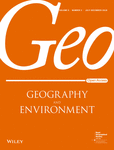
Geo-Geography and Environment
Unveiling Insights into Our Planet's DynamicsGeo-Geography and Environment is a leading open-access journal published by Wiley, dedicated to the interdisciplinary study of geographical phenomena and environmental dynamics. With an ISSN of 2054-4049 and an E-ISSN of 2054-4049, this journal has been making significant contributions to the field since its inception in 2014, actively promoting scholarly discourse with a commitment to open access since 2015. Based in the United Kingdom, the journal emphasizes high-quality research that spans various thematic areas, including Atmospheric Science, Geography, Planning and Development, and Environmental Science. In 2023, it has achieved notable rankings, standing in Q3 in Atmospheric Science and Q2 in Geography, Planning and Development, among others, reflecting its growing impact within the scholarly community. With an evolving scope and available access options, Geo-Geography and Environment serves as an essential resource for researchers, professionals, and students aiming to advance their knowledge and understanding of critical environmental issues and geographical trends.
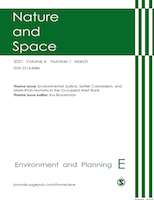
Environment and Planning E-Nature and Space
Connecting environmental insights with planning excellence.Environment and Planning E-Nature and Space is a prestigious journal published by SAGE Publications Inc, focusing on the critical intersection of environmental studies and spatial planning. With an impressive Impact Factor reflecting its academic influence and a Q1 quartile ranking in several categories including Development and Geography, Planning and Development, this journal serves as a vital resource for researchers, professionals, and students interested in contemporary issues surrounding nature, landscape conservation, and environmental policy. Spanning a converged period from 2018 to 2024, it publishes rigorously peer-reviewed articles that aim to advance knowledge and foster discussions on practices that influence our natural and developed environments. The journal's commitment to high-quality scholarship is further evidenced by its strong performance in Scopus rankings, standing within the top percentiles in its fields. Although it is not an open-access journal, the depth and relevance of its content make it an essential read for those dedicated to shaping sustainable futures.
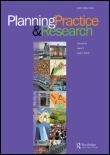
Planning Practice and Research
Fostering dialogue on contemporary spatial challenges.Planning Practice and Research, published by Routledge Journals, Taylor & Francis Ltd, is a leading academic journal in the field of geography, planning, and development, recognized for its contribution to understanding urban and regional planning dynamics since its inception in 1986. With an impressive Q2 ranking in the geography category and a Scopus rank that places it in the top 32% among its peers, this journal serves as a vital resource for researchers, practitioners, and students alike who are focused on addressing complex spatial challenges and fostering sustainable urban development. Despite its non-open access model, the journal provides a wealth of peer-reviewed articles that push the boundaries of scholarly inquiry, offering insights into innovative planning practices and policy applications. Researchers and practitioners can expect to find dialogues on contemporary issues, empirical studies, and theoretical explorations that are essential for advancing knowledge and practice in planning. For those involved in the fields of geography and development, Planning Practice and Research represents a crucial platform for sharing critical findings and fostering collaborative discussions aimed at shaping better communities worldwide.
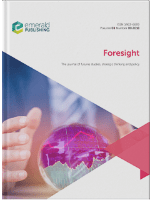
Foresight
Pioneering Research for Future-Ready OrganizationsForesight, ISSN 1463-6689, published by Emerald Group Publishing Ltd, is a pivotal journal within the fields of Business and International Management, Economics, Econometrics and Finance, Management of Technology and Innovation, and Management Science and Operations Research. Established in 1999 and set to continue its impactful publication until 2024, this journal aims to facilitate the dissemination of cutting-edge research and methodologies that explore future trends and challenges faced by organizations and economies. With prestigious category quartiles, including Q1 in Economics and Q2 rankings in the management disciplines, Foresight serves as a vital resource for researchers, professionals, and students seeking to enhance their understanding of forecasting and strategic planning. While currently offering traditional access options, future considerations may embrace broader open-access models to increase the journal's reach and impact.

Materials Futures
Driving discoveries that redefine materials innovation.Materials Futures, an esteemed journal published by IOP Publishing Ltd, stands out as a pivotal resource in the field of Materials Science, with a particular emphasis on Biomaterials. Launched in 2022 and operating under an Open Access model, the journal aims to foster accessibility and rapid dissemination of pioneering research, thus catering to the diverse needs of researchers, professionals, and students globally. With a commendable Scopus Rank of #46 out of 137 in its category, placing it in the 66th percentile, and recognized as a Q1 journal as of 2023, Materials Futures provides a vital platform for cutting-edge studies and innovations that address contemporary challenges in materials science. As the journal evolves through its convergence period from 2022 to 2024, it continues to attract high-quality submissions aimed at advancing knowledge and applications within the biomaterials sector, reflecting its commitment to contributing vital insights and fostering collaboration across disciplines. Explore Materials Futures for your research endeavors and join a community dedicated to shaping the future of materials.

REMEA-Revista Eletronica do Mestrado em Educacao Ambiental
Bridging Theory and Practice for a Sustainable Future.REMEA-Revista Eletronica do Mestrado em Educacao Ambiental, with ISSN 2318-4884 and E-ISSN 1517-1256, is an esteemed academic journal published by the Federal University of Rio Grande, Institute of Education, Brazil. This journal serves as a vital platform for disseminating research in the interdisciplinary field of environmental education. With a commitment to open-access publishing, REMEA aims to bridge the gap between theory and practice, fostering dialogue among educators, researchers, and practitioners who are dedicated to promoting environmental awareness and sustainability. Its mission encompasses a diverse range of topics, including pedagogical approaches, curriculum development, and innovative methodologies in environmental education. By providing a forum for high-quality research and critical analysis, REMEA significantly contributes to the evolution of best practices in environmental education, making it an essential resource for professionals and students alike seeking to enhance their knowledge and impact in this dynamic field.

Concentric-Literary and Cultural Studies
Elevating Scholarship in Literary and Cultural StudiesConcentric-Literary and Cultural Studies is a distinguished journal dedicated to advancing scholarship in the fields of literature and cultural studies. Published by the NATIONAL TAIWAN NORMAL UNIVERSITY, COLLEGE OF INTERNATIONAL STUDIES & SOCIAL SCIENCES, this journal offers a platform for researchers and academics to explore diverse topics that intersect literature and culture. With its ISSN 1729-6897 and E-ISSN 1729-8792, Concentric has been making significant contributions since its inception in 2012. Although presently listed in the Q4 quartile for both cultural studies and literature, the journal is committed to enhancing interdisciplinary dialogues and fostering innovative research approaches that push the boundaries of traditional scholarship. Residing in Taiwan, Concentric not only caters to local scholars but also reaches an international audience, providing access to critical perspectives and recent advancements in these pivotal fields. Aspiring to an impactful future, this journal continues to promote scholarly excellence and aims to ascend within academic rankings while engaging a robust community of researchers, professionals, and students.